i-Pro: With a Start-Up Mentality Into the AI Era
The Japanese camera developer and manufacturer i-Pro invited representatives of the international trade press to its headquarters in Japan in November. They were given an insight into the culture and work ethics of the company, which is specialized in edge AI cameras, and whose roots stem from the technology giant Panasonic. i-Pro has been an independent company in the market since 2019. Matthias Erler from GIT SECURITY was with them and spoke, amongst others, exclusively with Masato Nakao, Representative Director of the Board and CEO of i-Pro.

Freedom Inspires. Anyone looking at the development department of the video camera manufacturer i-Pro in the south-west Japanese town of Fukuoka and talking with the inspiring CEO Masato Nakao will themselves feel inspired. The MBA graduate engineer Nakao san, as he is properly and politely addressed in good Japanese, trained in Japan and the USA and is a visionary and experienced manager in the industry. When i-Pro was founded in 2019, Masato Nakao took on the position of Chief Executive Officer. The company had separated from the technology giant Panasonic back then, where the brand belonged to the Security Systems division. Under the leadership of Nakao, and borne by the confidence of a highly dynamic start-up, i-Pro has experienced extremely positive development since then.
Profitable Parting
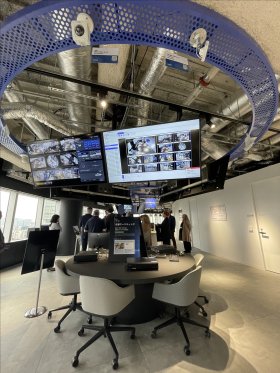
The separation from Japans industrial supertanker Panasonic first of all meant that the name of i-Pro, which was used as from 2022 – instead of ‘Panasonic i-Pro Sensing Solutions’ as initially used – had to become established in the market. How well this was achieved from the beginning by the young but simultaneously traditional company was reported by Masato Nakao to the international trade press: during Panasonic times, the turnover was falling each year in comparison to their competitors. I-Pro has managed to turn this around very successfully through the foundation of an independent company and a bundle of strategic decisions.
Whereas the development cycles in the old Panasonic world used to be some 20 to 30 months, they have now been reduced to 10 to 12 months, Masato Nakao reported. At the same time, the number of new products brought to market has simply exploded: from 15 – 30 models in Panasonic times to 50 – 100 models annually with i-Pro. This is a drastic increase, which is admirably demonstrated by the impressive product line-up.
The production times have developed in a similarly significant way: where the usual lead-time used to be 30 to 90 days, this has fallen since the start of independence to between 3 and 21 days. A further statistic, the Cash Conversion Cycle, shows that the strategy is working and, broadly speaking, shows exactly how long it takes for the sales of goods to have an effect on cash flow. This was some 90 to 100 days before, and lies today at 70 to 80 days.
Bundle of Success Strategies
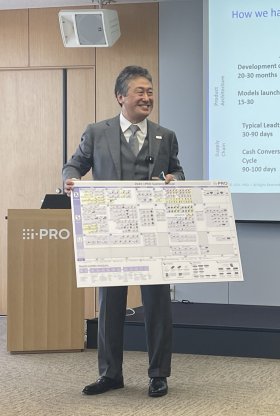
For Masato Nakao, the ‘made in Japan’ seal stands for the highest quality, reliability and endurance. Not only Panasonic is known for this high standard, but the whole of Japan – and of course i-Pro want to make use of this. This confidence is supported by a generous guarantee period of seven years.
But it is a set of strategic pillars that has been supporting the firm through this positive development since its creation, as Masato Nakao explained. Most important above all was a departure from the closed-shop model and a move to an open, modular system. As a provider of AI edge devices, the company works increasingly together with technology partners. Add to that the strictly-followed strategy of ‘time-based competition’. At the core, i-Pro has positioned itself as a provider of hardware, specializing in video cameras – within the market, where the progressive changes are strongly connected with software. Artificial intelligence is also accelerating this progress.
The well-supported cooperation with partners is paying off particularly well here: the Panasonic policy was to provide vertical industry solutions from one source. This brought the company into direct competition with a whole group of specialized companies, which was doomed to be less successful: the competition was simultaneous with developers of video management software (VMS), intelligent image and video analysis and its ever more intricate functionality, but also with system integrators.
Instead of this, says Masato Nakao, i-Pro changed to a horizontal approach that positioned the company as a provider of secure, AI-driven edge devices for the IoT, effectively at the interface of the real world with the virtual world of a network. This is where the massive amount of data is broadly processed and analyzed – an efficient, cost-saving way of lightening the load on the Cloud that also provides more accurate results. Cameras without such analytic capability will have a difficult time on the market in the future, according to the estimate of i-Pro management.
Growth Market Artificial Intelligence
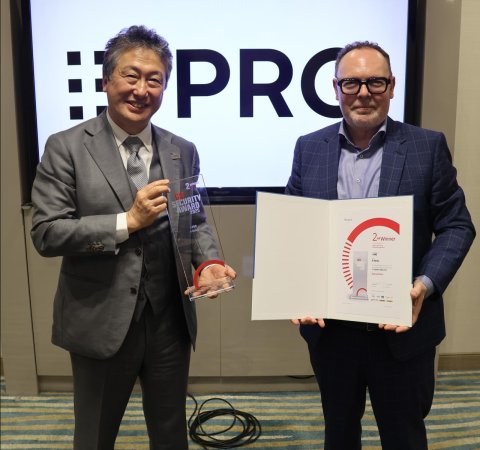
Masato Nakao considers artificial intelligence to be growth motor number one. But i-Pro is not putting everything into AI on the server, but into AI at the edge. This is where he considers the action to be – not least because there can be many different specialized types of AI instead of just one AI version on the server. i-Pro compares its business to the app-based development of smartphones. The camera does not have to be replaced just because the technology it contains is developing rapidly. i-Pro therefore offers a wide range of AI-compatible hardware – this enables widespread standardization but also makes it possible to meet highly specialized requirements.
The company still has the installed base in view though – the X Series for example, which also impressed the jury of the GIT SECURITY AWARD. The 16 models within the range can actually be upgraded with AI functionality. This is done thanks to a chip from Ambarella. A camera from the X Series can also process up to three further video streams from non-AI-capable cameras. And even a further aspect of artificial intelligence becomes evident – namely the ability to learn: the cameras learn about their specific place of installation and the objects that must be observed etc., that are important for the job of surveillance.
Worldwide Partner Network
To implement its strategy, i-Pro has joined forces with companies such as the visualization specialists Ambarella or Morpho, the Japanese provider of digital image processing technology and AI specialists. The video analysis developer Vaxtor, which concentrates particularly on license plate recognition, also belongs to the network of partners.
Proof that this is a tricky thing to do, and best left to a specialized partner, was demonstrated live by the Press Officer in the showroom of Huey (Hiroshi) Sekiguchi. He is the Chief Product Ambassador and Vice President of Strategic Partnership, and showed how cameras that are equipped with their technology can rapidly recognize the most exotic and faded license plates from around the world. This has enabled i-Pro “for the first time to bring the application of a third party together in a bundle with powerful edge-computing cameras to the market”, said Chief Product Officer Gerard Figols, and on the occasion of the market launch in November added: “The native integration of Vaxtor into i-Pro Active Guard shows how our hardware and external software partners can provide an incomparable added value for security-critical applications.”
Also, the world of video management analysis shows that one works with important market players: Milestone, Genetec and Eagle Eye Networks are among i-Pro’s partners. In Germany, Mobotix is also on board. The company has already been working since 2020 on the development of cameras together with i-Pro. Mobotix uses selected high-end camera hardware from i-Pro in this strategic cooperation. Mobotix also has its focus on video technology for data usage, and wants to strengthen its vertical solutions palette on the basis of open partnerships.
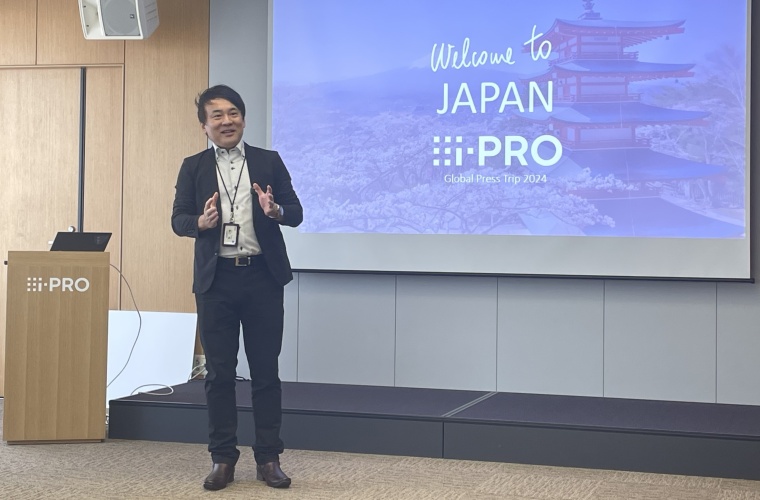
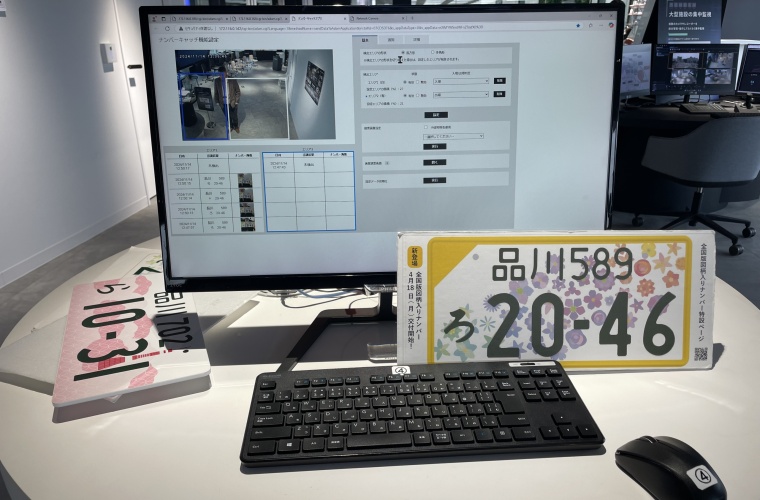
Time-Based Competition
The ‘time based competition’ brings the factor of time as a significant enabler of success into view, as Masato Nakao mentions. This is where companies arrange the processes between receiving an order and delivering the product as efficiently as possible by improving the ability to react through improved information exchange between all the parts of the company that are involved.
For i-Pro, this strategy has led to the decision to largely avoid manufacturing complete products that promise to deliver a certain turnover. Instead of this, the company produces various versatile modules – effectively half-finished products – that are always on stock in large numbers. Their different usage options, on the other hand, reduce the development time of all the products in which the modules can be used. This enables a very quick reaction to new orders.
This approach is realized at i-Pro through the organizational nearness of sales, manufacturing and development. The development and manufacturing in particular work spatially close to one another. This is also a big advantage that i-Pro did not previously have as just a small cog within the big Panasonic machine. The company can now react very quickly and has reduced lead times. The customers have benefitted, and it is also ensuring profitable growth at the same time. Prompt service is ensured for the system integrators that the company supports. Its own trained team supports them with the installation, and with their choice and integration of products.
Strategy for the German and European Markets
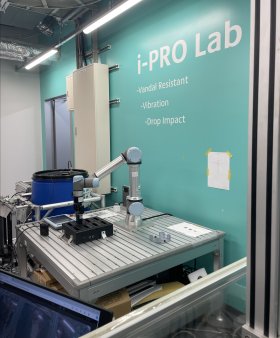
The European market is one of the most highly developed markets, says Masato Nakao in his exclusive conversation with GIT SECURITY – and it has similarities with the American market. i-Pro wants to build its strategy considering this situation, even though the competitive situations within Europe are very different from one country to the next. The particular aspect of the German market is that it is similar to the Japanese market. The local German manufacturers such as Bosch and Siemens are very strong, the same as with Panasonic, Sony, or Hitachi in Japan. This makes it difficult for foreign companies to establish themselves in the market.
According to Nakao, it is therefore important for i-Pro to work together with German companies – an example of this is the cooperation with Mobotix. They want to work with the end users, but also with the OEMs in Germany. The company is taking a similar approach with Siemens; the strategy is to make use of the most important brands in Germany, also in the long term.
According to Masato Nakao, the so-called ‘mission critical verticals’ are important worldwide for i-Pro, which includes critical infrastructure as well as all those sectors where many people come together and an equipment failure is not an option. i-Pro wants to apply its AI technology here to prevent accidents, crime, or similar events while enabling first responders to react quickly. The aim is to help those responsible on site to take the right decisions.
AI in particular can only help after an event has occurred, such as in the case where a database is scrutinized later for a person wearing a red jacket. The idea is to stop events before they become dangerous. It is all about increasingly using artificial intelligence for the prevention of accidents and crime. From his point of view, there is no alternative to getting involved with this technology – it is the only way to turn it to good use.
i-Pro has established its own internal guidelines on the ethical use of artificial intelligence, says Nakao. These are accompanied by a whole range of measures to ensure their implementation within the company. These include corresponding training programs, conversations with the developers and constant checking that the guidelines have been adhered to. Nakao himself is chairman of an i-Pro-internal committee on this matter and is preparing the ISO certification.
With respect to data protection and data security, he considers not only Germany but also the whole of Europe to be sensitive to the subject, says Masato Nakao. i-Pro therefore works to comply with the AI guidelines of the EU. In addition, his company has also signed up to the Global Digital Compact of the United Nations. Without all these measures, you cannot be a player in the European market.
most read

When the Internet stumbles: Why DNS is important
When DNS fails, the internet stumbles-AWS outage proves resilience and redundancy are vital for digital trust

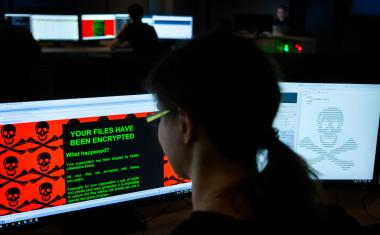
Training at Fraunhofer SIT: Strengthening resilience against cyber attacks
Knowledge in cyber security is evolving rapidly - continuous training is therefore important.

Integrated and Futureproof: Traka’s Next Chapter
Interview with Stefni Oliver on Traka’s Vision for the Future

Safety and Security in an Emergency: How companies take responsibility with strategic personal protection and amok prevention
Personal protection & amok prevention: strategic concepts, training & responsibility for corporate safety and security









